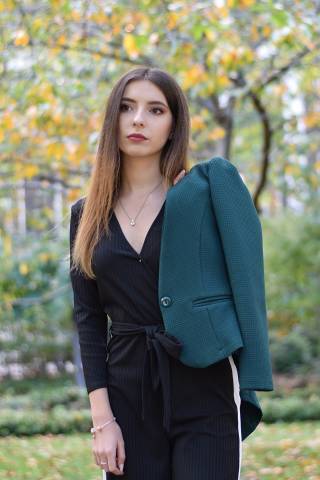
How would you describe your area of study or work?
I study Security and Crime Science which is a relatively new area of engineering. It aims to reduce crime by using scientific methods and empirical research in a multidisciplinary manner. It brings social and physical sciences together to generate hypotheses about how, why, when and where crime happens, build testable models to explain them and then develop real-world strategies to reduce crime.
What is your favourite part of your job/area of study/area of research?
I love how multidisciplinary this field is as it allows freedom and creativity. Above all, no matter how difficult or impossible some of the things that we are trying to answer are, the purpose of crime science is to improve or, in some cases, save people’s lives in order to make society safer with every piece of research, strategy or technology. It makes everything that little bit more worth it.
What is the most valuable lesson you have learnt during your studies/career so far?
Anything good comes with a lot of hard work. We don’t have all the answers yet and a lot more work and research needs to be done, which requires dedication and effort. And, whilst not many people realise, this field also requires a lot of creativity to make sense of theory and apply it effectively in the real world.
Describe your day-to-day life as an engineer/engineering student
As a student, I have lectures and tutorials on a daily basis. But being an engineering student also involves a lot of individual learning and research, as well as taking part in project weeks every term. During project weeks, we work in teams to tackle projects with real-world practical problems. This provides a sneak peak into the industry, which involves many hours of individual, as well as team, work.
What attracted you to participate in outreach and engagement activities?
I have done volunteering work for years so I’ve always had a interest in these types of activities. I like putting whatever skills and knowledge I may have to good use and it’s personally rewarding as well. You feel like, even in a small way, you’re making a difference.
Back in high school I tutored two middle school pupils in a local orphanage on Mathematics and Literature and helped them prepare for their exams. It was a challenging but deeply rewarding experience. It taught me not only how to explain and work with younger children, but how to listen, understand and form a connection. It also opened my eyes to the hardships and challenges that children from under-represented backgrounds face when it comes to education and opportunities.
What is the best thing about being involved in outreach activities?
Interacting with the young people, for sure! Getting to know them and what their dreams for the future are is really inspiring. And even when one person tells you that you’ve helped them and made a difference in their lives, it makes it all worth it.
What type of activities or programmes have you led/run?
As a UCL Engineering Outreach tutor this year I’ve gone into a school in East London to tutor Year 11 students that need a bit of extra help in Mathematics for their GCSE exam, as well as help out in their maths study groups. I have also volunteered as a STEM Ambassador at the Big Bang Fair in Birmingham as part of the STEM Careers Cabin, where I got to talk to over 100 young people about engineering career pathways and my personal journey into science and engineering.
What outreach activity or programme are you most proud to have been involved with?
Tutoring Year 11 students on mathematics was by far my most rewarding experience. I got to interact with multiple students and not only help them and maybe change their perspective on Mathematics for the better, but learn about their aspirations and hopes for the future. I hope they’ve learned from me at least half as much as I’ve learned from them.
What advice would you give young people wanting to study or work in STEM-related fields?
Work hard for what you want and be prepared to work even harder in the future, it’s a field that never stops evolving and progressing. You will always have to learn new things and adapt, but that’s what makes it interesting. Find what inspires you and follow it.
 Close
Close

